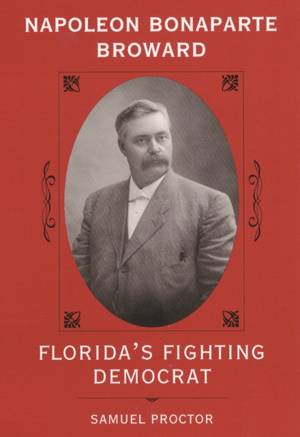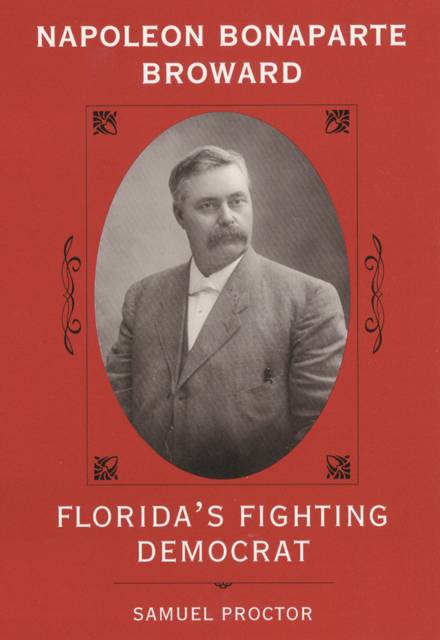
Je cadeautjes zeker op tijd in huis hebben voor de feestdagen? Kom langs in onze winkels en vind het perfecte geschenk!
- Afhalen na 1 uur in een winkel met voorraad
- Gratis thuislevering in België vanaf € 30
- Ruim aanbod met 7 miljoen producten
Je cadeautjes zeker op tijd in huis hebben voor de feestdagen? Kom langs in onze winkels en vind het perfecte geschenk!
- Afhalen na 1 uur in een winkel met voorraad
- Gratis thuislevering in België vanaf € 30
- Ruim aanbod met 7 miljoen producten
Zoeken
Omschrijving
From reviews of the first edition:
"The impact of [Broward's] career upon the Florida political scene is told by Samuel Proctor with a skill that combines suspense and accuracy. . . . A great contribution in the field of Florida history."--Miami Daily News "The first full-dress biography of [a] colorful Florida politician. . . . His name is perpetuated in the county created at the height of the drainage boom for which he was chiefly responsible. But to many Floridians the name of Broward means a daring filibusterer who smuggled guns and guerrillas to Cuba's revolutionaries. That melodramatic chapter of Broward's life is not overlooked by biographer Proctor."-- Miami Herald Now in a new paperback edition, Samuel Proctor's popular biography was first described as "a lusty narrative of a lusty age." Revealing the politics and intrigues of frontier Florida in the period still known as the "Broward Era," Proctor describes the life and liberal administration of Napoleon Bonaparte Broward (1857-1910), elected governor of Florida in 1904.
Hailed as chief of the "wool hat" faction in Florida and as a leader of the populist movement in the South and throughout the country, Broward identified with laborers, farmers, and tradesmen and fought bitterly against the railroad magnates, lumber barons, and land pirates who dominated Florida politics after the Civil War. Under his leadership the legislature passed the progressive Buckman Act, which consolidated seven state colleges into two universities at Gainesville and Tallahassee and unified them under a Board of Control, and enacted tax reforms, child labor restrictions, and regulations to prevent the sale of cigarettes to minors. In an effort to turn acres of rich muck into productive farmland, Broward initiated the Everglades drainage project (with the now infamous slogan "Water will run downhill").
Through his life passed such figures as Theodore Roosevelt, inspecting newly rebuilt Jacksonville after the 1901 fire; Carry Nation, waving her Prohibition banner; Gentleman Jim Corbett, defending his heavyweight boxing title in Jacksonville; and Cuban patriots boarding Broward's famous river steamer, The Three Friends.
For this work Proctor examined newspaper files and letters and documents held by the Broward family and interviewed several of the governor's political associates and his immediate family, including children, a sister, and his widow (who received the first copy of the book off the press in 1952).
Samuel Proctor is distinguished service professor of history at the University of Florida and editor of the Bicentennial Floridiana Facsimile Series (UPF). He is the author of Gator History: A Pictorial History of the University of Florida, Jews of the South: Selected Essays, and Florida a Hundred Years Ago and coeditor of Tacachale: Essays on the Indians of Florida and Southeastern Georgia during the Historic Period. He is also the longtime editor of the Florida Historical Quarterly.
"The impact of [Broward's] career upon the Florida political scene is told by Samuel Proctor with a skill that combines suspense and accuracy. . . . A great contribution in the field of Florida history."--Miami Daily News "The first full-dress biography of [a] colorful Florida politician. . . . His name is perpetuated in the county created at the height of the drainage boom for which he was chiefly responsible. But to many Floridians the name of Broward means a daring filibusterer who smuggled guns and guerrillas to Cuba's revolutionaries. That melodramatic chapter of Broward's life is not overlooked by biographer Proctor."-- Miami Herald Now in a new paperback edition, Samuel Proctor's popular biography was first described as "a lusty narrative of a lusty age." Revealing the politics and intrigues of frontier Florida in the period still known as the "Broward Era," Proctor describes the life and liberal administration of Napoleon Bonaparte Broward (1857-1910), elected governor of Florida in 1904.
Hailed as chief of the "wool hat" faction in Florida and as a leader of the populist movement in the South and throughout the country, Broward identified with laborers, farmers, and tradesmen and fought bitterly against the railroad magnates, lumber barons, and land pirates who dominated Florida politics after the Civil War. Under his leadership the legislature passed the progressive Buckman Act, which consolidated seven state colleges into two universities at Gainesville and Tallahassee and unified them under a Board of Control, and enacted tax reforms, child labor restrictions, and regulations to prevent the sale of cigarettes to minors. In an effort to turn acres of rich muck into productive farmland, Broward initiated the Everglades drainage project (with the now infamous slogan "Water will run downhill").
Through his life passed such figures as Theodore Roosevelt, inspecting newly rebuilt Jacksonville after the 1901 fire; Carry Nation, waving her Prohibition banner; Gentleman Jim Corbett, defending his heavyweight boxing title in Jacksonville; and Cuban patriots boarding Broward's famous river steamer, The Three Friends.
For this work Proctor examined newspaper files and letters and documents held by the Broward family and interviewed several of the governor's political associates and his immediate family, including children, a sister, and his widow (who received the first copy of the book off the press in 1952).
Samuel Proctor is distinguished service professor of history at the University of Florida and editor of the Bicentennial Floridiana Facsimile Series (UPF). He is the author of Gator History: A Pictorial History of the University of Florida, Jews of the South: Selected Essays, and Florida a Hundred Years Ago and coeditor of Tacachale: Essays on the Indians of Florida and Southeastern Georgia during the Historic Period. He is also the longtime editor of the Florida Historical Quarterly.
Specificaties
Betrokkenen
- Auteur(s):
- Uitgeverij:
Inhoud
- Aantal bladzijden:
- 416
- Taal:
- Engels
- Reeks:
Eigenschappen
- Productcode (EAN):
- 9780813011912
- Verschijningsdatum:
- 20/04/1993
- Uitvoering:
- Paperback
- Formaat:
- Trade paperback (VS)
- Afmetingen:
- 163 mm x 233 mm
- Gewicht:
- 648 g

Alleen bij Standaard Boekhandel
+ 76 punten op je klantenkaart van Standaard Boekhandel
Beoordelingen
We publiceren alleen reviews die voldoen aan de voorwaarden voor reviews. Bekijk onze voorwaarden voor reviews.









